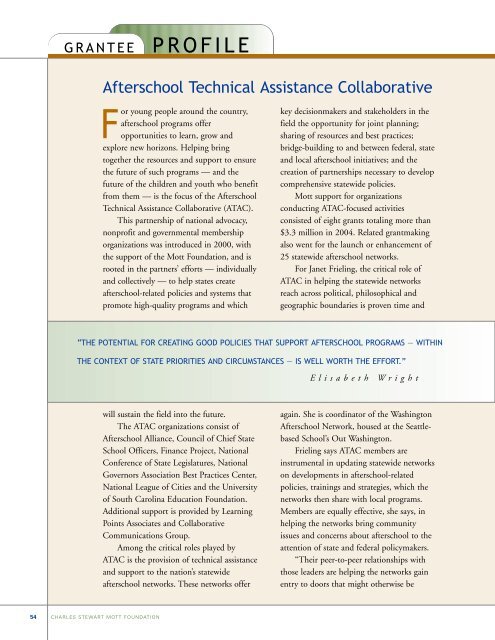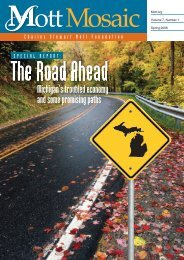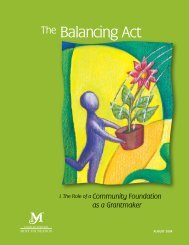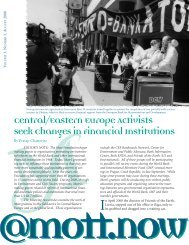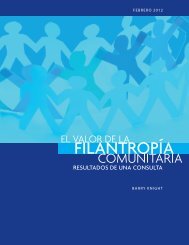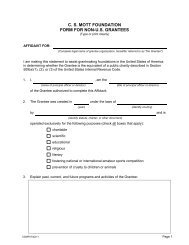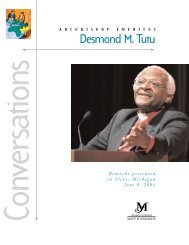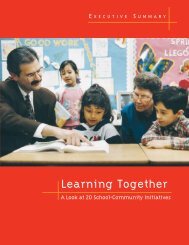Annual Report 2004 - Charles Stewart Mott Foundation
Annual Report 2004 - Charles Stewart Mott Foundation
Annual Report 2004 - Charles Stewart Mott Foundation
Create successful ePaper yourself
Turn your PDF publications into a flip-book with our unique Google optimized e-Paper software.
GRANTEE<br />
PROFILE<br />
Afterschool Technical Assistance Collaborative<br />
For young people around the country,<br />
afterschool programs offer<br />
opportunities to learn, grow and<br />
explore new horizons. Helping bring<br />
together the resources and support to ensure<br />
the future of such programs — and the<br />
future of the children and youth who benefit<br />
from them — is the focus of the Afterschool<br />
Technical Assistance Collaborative (ATAC).<br />
This partnership of national advocacy,<br />
nonprofit and governmental membership<br />
organizations was introduced in 2000, with<br />
the support of the <strong>Mott</strong> <strong>Foundation</strong>, and is<br />
rooted in the partners’ efforts — individually<br />
and collectively — to help states create<br />
afterschool-related policies and systems that<br />
promote high-quality programs and which<br />
key decisionmakers and stakeholders in the<br />
field the opportunity for joint planning;<br />
sharing of resources and best practices;<br />
bridge-building to and between federal, state<br />
and local afterschool initiatives; and the<br />
creation of partnerships necessary to develop<br />
comprehensive statewide policies.<br />
<strong>Mott</strong> support for organizations<br />
conducting ATAC-focused activities<br />
consisted of eight grants totaling more than<br />
$3.3 million in <strong>2004</strong>. Related grantmaking<br />
also went for the launch or enhancement of<br />
25 statewide afterschool networks.<br />
For Janet Frieling, the critical role of<br />
ATAC in helping the statewide networks<br />
reach across political, philosophical and<br />
geographic boundaries is proven time and<br />
“THE POTENTIAL FOR CREATING GOOD POLICIES THAT SUPPORT AFTERSCHOOL PROGRAMS — WITHIN<br />
THE CONTEXT OF STATE PRIORITIES AND CIRCUMSTANCES — IS WELL WORTH THE EFFORT.”<br />
Elisabeth Wright<br />
will sustain the field into the future.<br />
The ATAC organizations consist of<br />
Afterschool Alliance, Council of Chief State<br />
School Officers, Finance Project, National<br />
Conference of State Legislatures, National<br />
Governors Association Best Practices Center,<br />
National League of Cities and the University<br />
of South Carolina Education <strong>Foundation</strong>.<br />
Additional support is provided by Learning<br />
Points Associates and Collaborative<br />
Communications Group.<br />
Among the critical roles played by<br />
ATAC is the provision of technical assistance<br />
and support to the nation’s statewide<br />
afterschool networks. These networks offer<br />
again. She is coordinator of the Washington<br />
Afterschool Network, housed at the Seattlebased<br />
School’s Out Washington.<br />
Frieling says ATAC members are<br />
instrumental in updating statewide networks<br />
on developments in afterschool-related<br />
policies, trainings and strategies, which the<br />
networks then share with local programs.<br />
Members are equally effective, she says, in<br />
helping the networks bring community<br />
issues and concerns about afterschool to the<br />
attention of state and federal policymakers.<br />
“Their peer-to-peer relationships with<br />
those leaders are helping the networks gain<br />
entry to doors that might otherwise be<br />
54 CHARLES STEWART MOTT FOUNDATION


